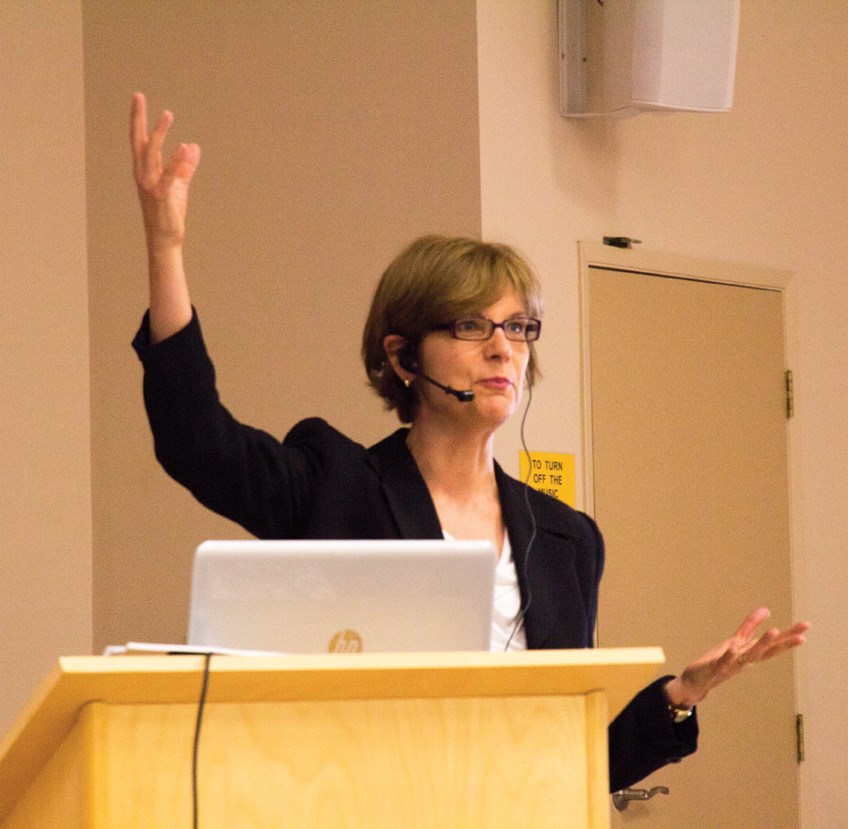The B.C. government’s seniors advocate, Isobel Mackenzie, has found that the systems in place to support our elderly population are seriously lacking. Mackenzie was in Sechelt on Saturday, May 23, where she addressed well over 100 people with the problems, and proposed solutions, from her report: “Seniors Housing in BC — Affordable, Appropriate, Available.”
After crunching the numbers, Mackenzie showed that the cost of living for seniors is higher than the median income for seniors in communities all over B.C. Her proposal is called the homeowner expense deferral account program.
“The idea is that the government would pay — on your behalf — what you would choose to have them pay,” Mackenzie explained. “It could be your hydro bill every month, the homeowner insurance every year, your municipal utilities.
“If you have a major repair or maintenance, like a $25,000 roof repair, the government would pay to have your roof [repaired]. And they would collect the money back, with a small interest fee, when the house is sold.”
Accessing a house’s equity through a reverse mortgage is a similar option, but not as good an option, according to Mackenzie, as the interest rates — plus the compounded interest — at the banks would eat up most of the equity.
The homeowner deferral program that Mackenzie is proposing would charge only 1.5 per cent simple interest to the homeowner.
“When you run the numbers, you see that it’s a very sustainable proposition,” she said.
Another issue she brought up is assisted living.
“I was around when assisted living was created,” Mackenzie said. “Our revision of what we thought assisted living would do, as we look back 15 years later, is that it’s accomplished some of that. But as with a lot of things, when you look back you realize that you didn’t get everything right, and there were some unintended consequences.”
An unintended consequence, for example, is the screening process for assisted living.
Assisted living is one of three options for seniors who are losing their abilities to function smoothly on their own. The first option is living at home, but that requires there to be a family member, friend or nurse to do regular check-ins.
The next option is assisted living, where seniors live in a facility with full-time support staff to help them.
The last is residential care. Although only about four per cent of seniors in B.C. are in residential care, many who are suitable for assisted living are ending up there due to the screening process.
Assisted living offers six prescribed services, including structured behaviour management, assistance for daily activities such as getting dressed, and administration and monitoring of medications.
The problem Mackenzie identified is that for any one assisted living facility, only two of the six prescribed services may be offered. So if you’re a senior and you need help with your medication, getting dressed, and physiotherapy, residential care could be the only option.
In a statement released after Mackenzie’s report came out, the B.C. Ministry of Health said it agrees with the general findings of the report and will act on the majority of recommendations.
“Actions include work to identify a new approach to Registered Assisted Living to accommodate a greater range of seniors, reducing premature or inappropriate admission into residential care and improving the process for ranking preferred facility transfer requests, along with providing greater transparency for seniors and their families in that process,” the ministry said.
“Some of the recommendations have wide-reaching implications for the health authorities, for the ministry and for the seniors’ housing sector and will need further analysis before we can commit to an approach,” the statement added.
“Seniors want to age in place,” local seniors housing advocate Sue Jackel said. “If implemented, the solutions suggested with regard to independent and assisted living and residential care will go a long way to making that more of a reality.”
Mackenzie was appointed as Canada’s first seniors advocate in 2014. Her role is to monitor the aging population in B.C. and advise the government on her findings. Her full report can be found at seniorsadvocatebc.ca



